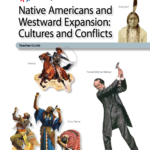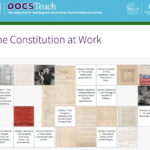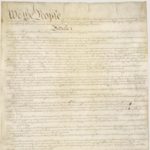The Constitutional Index breaks down the U.S. Constitution by Section, Amendment, and Clause and contains broader topics and themes. These are used to cross-reference Library resources in an effort to annotate constitutional history.
Native Americans: Cultures and Conflicts (CKHG Unit)

Across 7 lessons, this unit explores the ways of life of diverse Native American peoples and how their cultures were disrupted, displaced, and profoundly altered by westward expansion and American government policies and practices in the 1800s. Some of the content of this unit is tied to the “Pathway to Citizenship,” an array of civics-focused knowledge, questions, and activities.
The Constitution in Action: Who Shapes Foreign Policy?
History is the chronicle of choices made by actors/agents/protagonists in specific contexts. This simulation places students in the Early Republic and asks them to engage with a fundamental question of Constitutional interpretation faced at that time: Who controls foreign policy, Congress or the President? Students will explore this sweeping question with respect to Washington’s Neutrality Proclamation of 1793 and Jay’s Treaty.
Grade 9-12 Executive Branch Document Exploration
The purpose of this lesson is to assist student exploration of several of the primary source documents related to the creation of the executive branch. Through independent reading followed by a round robin assignment and an essay to explore current application of executive power, students will develop their historical inquiry skills and understand the scope and meaning of executive power under the U.S. Constitution.
Grade 6-8 An Energetic Executive
The purpose of this lesson is to assist student understanding of the expressed and implied powers of the president. By the conclusion of this lesson, students will understand the scope and purpose of these powers and be able to describe how they play out in real life. Students will also understand the importance of constitutional checks on presidential powers–examining the ways that a president could abuse his or her power should constitutional checks not exist.
The Constitution at Work
The Constitutional Convention: Lesson 3: Creating the Office of the Presidency

This lesson focuses on the arguments over the various characteristics and powers of the office of president as debated at Constitutional Convention of 1787. By examining the views of delegates as recorded in James Madison’s Notes of Debates in the Federal Convention of 1787, students will understand the arguments of those who supported either a strong, independent executive, or a very limited and highly controlled executive. Students will also see why, in the end, the delegates compromised.

